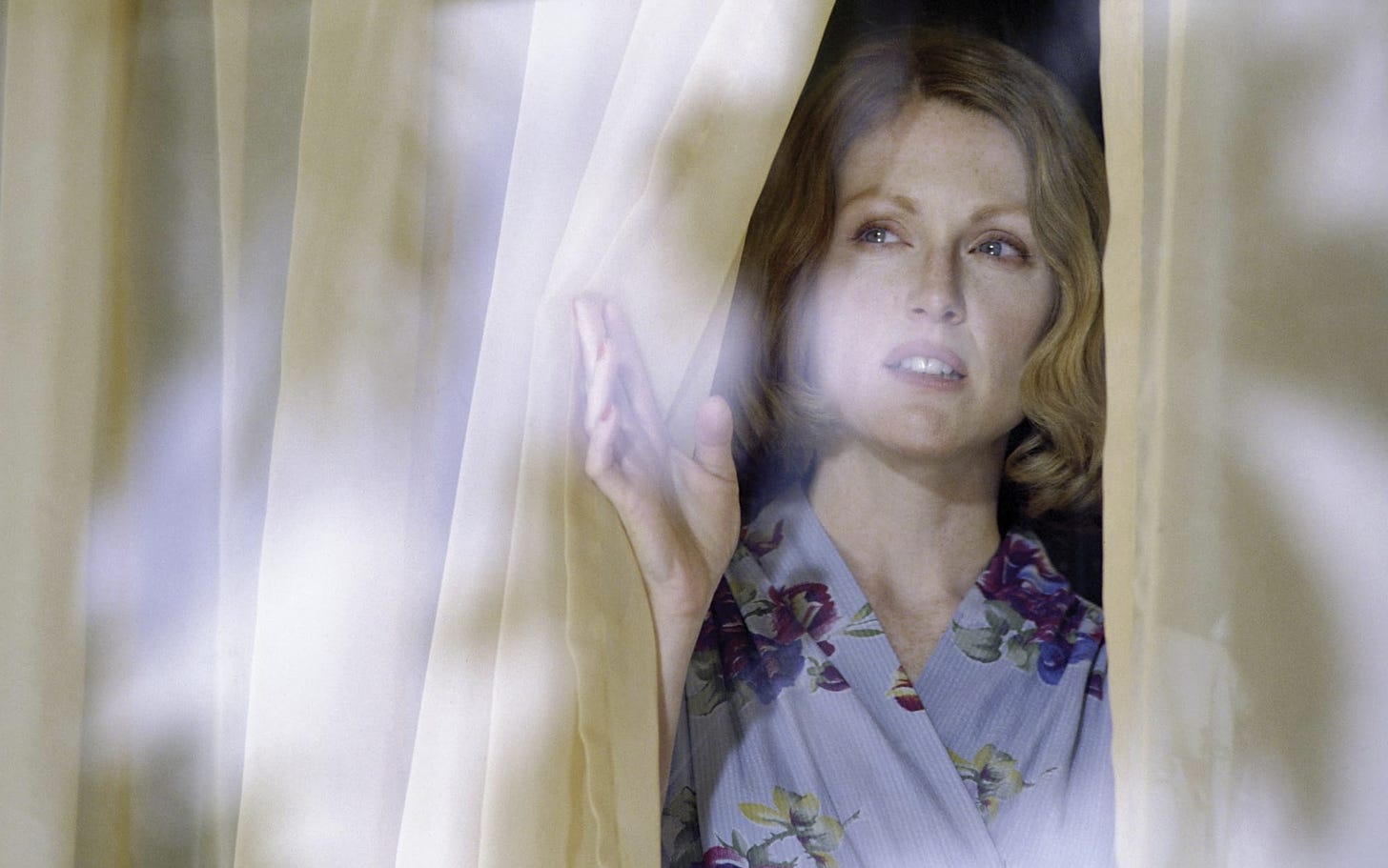Directed: Stephen Daldry
Written: David Hare
The unfilmable novel. That's what Michael Cunningham's The Hours was called in Hollywood. Any attempt at a film adaptation was going to be spectacularly awful. The anticipation before this film's release was palpable—could it be pulled off? Could the script ever do justice to the novel? Would the audience even understand what was going on? Can you sell two literary masterpieces in one film to a pop-soaked public?
I wasn't very optimistic when the advance press focussed more on Kidman's nose prosthetic than the substance of the film. But better press did arrive. Meryl Streep and Julianne Moore cast together in the same film excited me more than I can tell you, and yet, when the time for awards came, it was Kidman who pulled out the Oscar.
Regardless of who won, 2002 defined Julianne Moore. Having already stunned in such films as Boogie Nights, An Ideal Husband, Magnolia and The End of the Affair, she waltzed in and delivered Far From Heaven and The Hours back to back. Moore's was one of the greatest all-time performances, certainly better than Kidman's—fake nose or not.
OK, that soapboxing over with, I will say that The Hours is a breathtaking piece of cinema.
Virginia Woolf (Nicole Kidman) lives with her husband Leonard in isolated Richmond and longs to return to the society of London. Every day she fights off the mental demons that torture her. Today she begins work on "Mrs Dalloway" a book that is destined to become a classic.
With understated elegance, Kidman portrays Woolf as a woman in immense pain that must be shielded from the world. She longs for a society that her mind and constitution cannot handle. She seems to long to be anything but who she is. While doing so she writes the first, famous line from her novel; "Mrs Dalloway said she would buy the flowers herself."
Clarissa (Meryl Streep) steps out into the fine New York weather to buy flowers for a party she is giving that night for her friend Richard who is receiving a literary award. He is also dying of AIDS. Clarissa has sacrificed a lot to be Richard's friend—even alienating herself from her partner (the superb Alison Janney). By the end of the day her entire world will be turned upside down, decimated and unravelled, just like Mrs Dalloway, a nickname Richard affectionately bestowed upon her when they were still young.
Laura (Julianne Moore), a housewife in the fifties, rises to face yet another day of being married, pregnant and looking after her young son, Richie. The household she runs is a pretense. She married because that was what women did. What she wants is time alone to read her book, "Mrs Dalloway". She wants to follow her own heart, not live this imposed horror. She receives a visit from a friend, Kitty (Toni Collette) who must go into hospital and is quietly terrified.
They share a precious moment (As friends? Potential lovers?) before Kitty leaves and once again Laura is stuck in her life, only this time with the weight of knowing she could die one day, soon, having never experienced a single one of her own dreams. So why put that day off? She could end it right there, that moment, but with a young son to raise and another on the way is the bravest act to end it all or to continue on and force a change? Or do something else entirely?
During the Virginia Woolf chapters of the novel "The Hours" Virginia conjectured about the ending for Mrs Dalloway. Someone will die at the end, she muses. Virginia isn't sure who it will be. At first it was meant to be Mrs Dalloway herself. She would take her own life. But she doesn't. In the end it is someone else who dies, to remind Mrs Dalloway of the importance of her own life, regardless of how flawed and trivial it seems to be.
In the film there are two people who die. The others live on and they begin to live the way they were meant to. I could watch this film a thousand times and still be in equal measures bewitched, surprised and frustrated by it. Is Clarissa's partner having an affair? What was in that unreadable novel Richard wrote and Clarissa doesn't like to talk about? What did Laura do with her life and did she give into her desires for women? So many questions, but the film is that much the better for only answering the questions it chooses.







